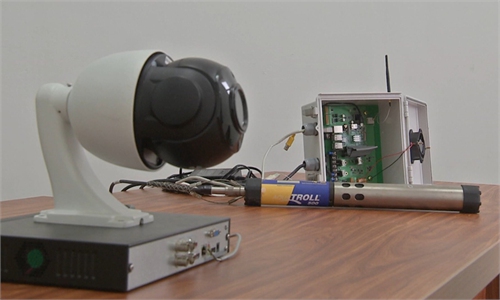Top legislature to deliberate Counter-Espionage Law amendment with focus on fighting cyber spying

cyber attack Photo:VCG
China's top legislature is set to review the draft of a Counter-Espionage Law Amendment in a Monday-Wednesday session to improve regulation on cyber espionage activities amid the nation's push for overall national security.
The Standing Committee of the 14th National People's Congress (NPC) will deliberate on the draft, Zang Tiewei, spokesperson for the Legislative Affairs Commission of the NPCSC, said at a Friday press briefing.
Major adjustments in this third draft of the amendment included improving the regulations on cyber espionage.
In light of the characteristics of information networks, the draft amendment clarifies that cyber attacks, intrusions, interference, control, and destruction by espionage organizations and their agents against state organs, secret-related units, or key information infrastructure, are classified as espionage.
A second move aims to balance empowerment with restrictions on power, increasing relief procedures.
The draft amendment stipulates that if a network security risk or information involving espionage has been eliminated after taking relevant measures, the related authorities should make timely decisions to resume information transmission and services.
Zang noted that the Counter-Espionage Law is the first important law to implement the concept of overall national security in our country. It is also a special law for regulating and guaranteeing the counter-espionage struggle, and has played an important role in maintaining national security.
The current situation of the counter-espionage struggle is severe, in which traditional and non-traditional security threats are intertwined, according to Zang. The subjects of espionage and intelligence activities are more complex, the fields are wider, the targets are more diverse, and the methods are more covert, Zang said.
The current Counter-Espionage Law was promulgated in 2014 and it is time to make amendments in accordance with new realties to tackle increasingly frequent cyberattacks on different targets, Fang Xingdong, founder of Beijing-based technology think tank ChinaLabs, told the Global Times on Saturday.
The damage done by cyberattacks has grown from "small troubles" to "national affairs." In the digital age, cyberattacks could lead to power outages, supply cuts to meat and oil as daily food necessities, and broadcast interruptions, having an incalculable impact on people's lives, enterprise production and social stability, according to analysts.
In one case in 2022, the email system of a university in Northwest China's Shaanxi Province - well-known for its aviation, aerospace and navigation studies - was found to have been attacked by the US' National Security Agency (NSA).
Ahead of April 15, 2023, the 8th National Security Education Day, a series of typical cases were revealed including one involving the use of "internet identity" for criminal activities. A civil servant in Xinjiang region met a netizen through a mobile dating app and became a tool for an overseas spy agency to collect sensitive local information.
In addition to the Counter-Espionage Law, the draft Qinghai-Xizang Plateau Ecological Conservation Law will go through a third review at the NPCSC session starting Monday, with items asking for better monitoring and scientific research on the plateau and special protection for glaciers and tundra. The draft Barrier-Free Environments Development Law will also be reviewed.


